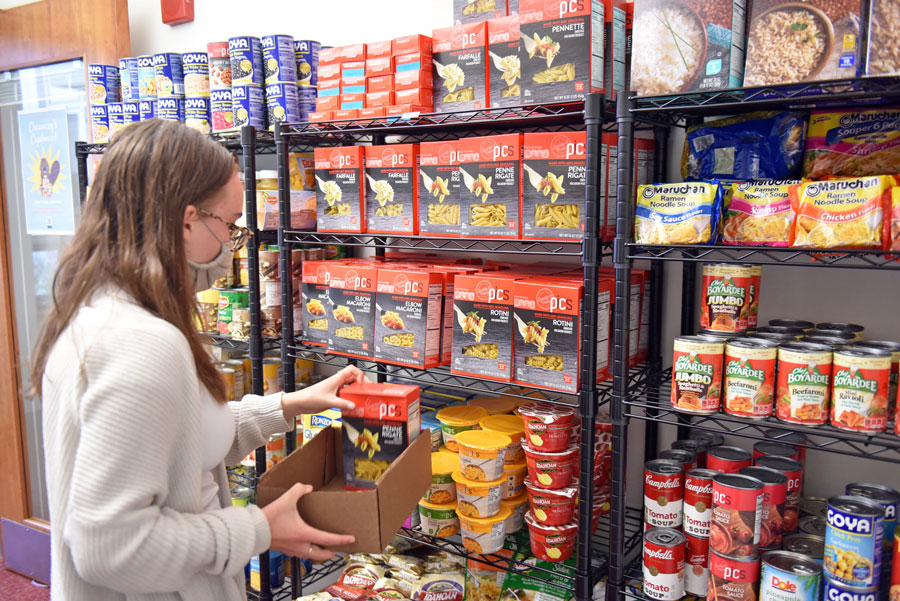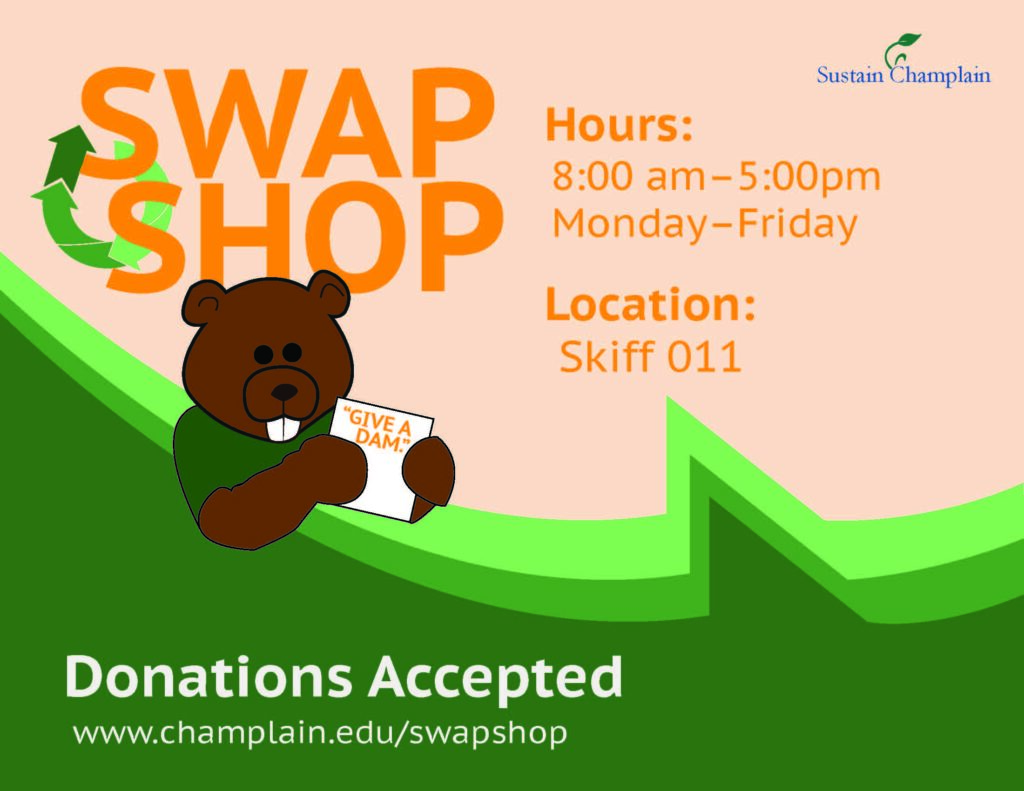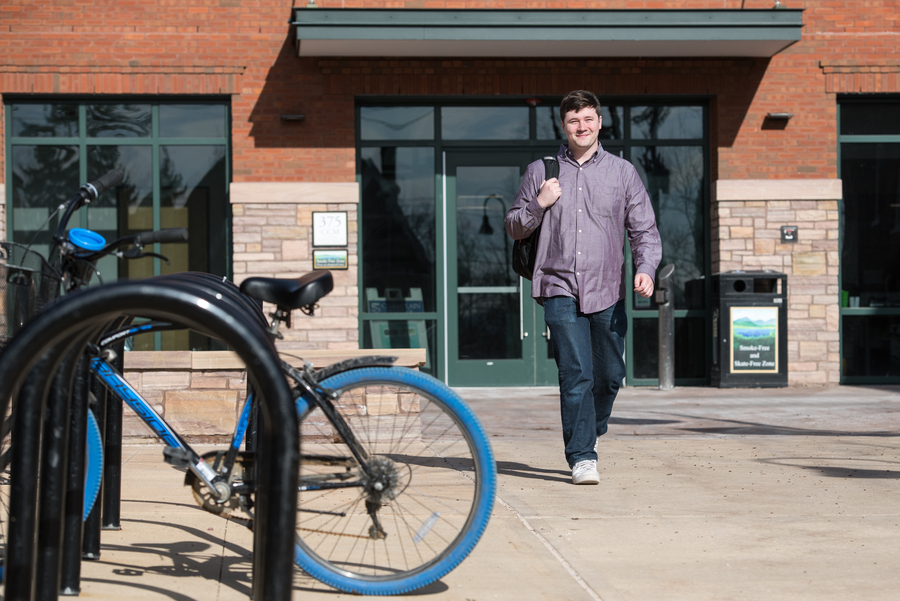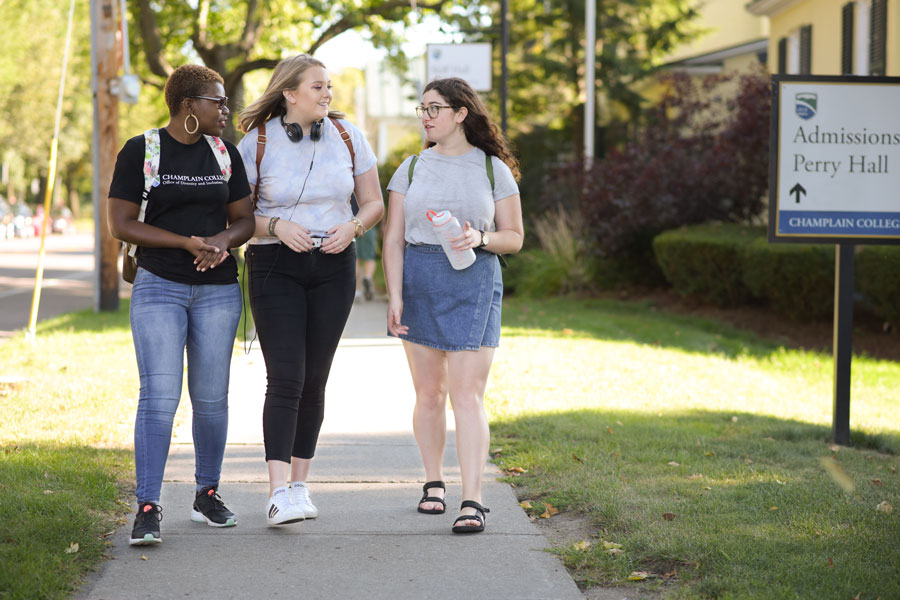Looking for small ways to reduce your carbon footprint? We asked Champlain College’s Eco-Reps where to begin.
Welcome to Earth Month! We will be highlighting various facets and faces among the Champlain community this month that help us move the needle toward a sustainable future.
When it comes to sustainability efforts at Champlain, the Center for Service and Sustainability is our hub. Offering opportunities for students, faculty, and staff to engage in meaningful ways with environmental and social sustainability initiatives, the Center combines community service with academic instruction for critical, reflective learning experiences.
Leading the charge for students are the Eco-Reps: peer educators and ambassadors for sustainable living best practices and behaviors across campus and residence halls. We asked the Eco-Reps what habits they recommend their peers implement to make an impact in their everyday lives. Here are five tips to try out during Earth Month:


1. Visit the Swap Shop or Chauncey’s Cupboard
“I’d like students to know that there is literally free stuff of good quality at the swap shop and at Chauncey’s Cupboard. It’s mind blowing to think that you can live more sustainably by choosing to get something for free than to buy it,” said Eco-Rep and Integrative Professional Studies major Katherine Taddeo ’23.
Chaucey’s Cupboard provides access to non-perishable foods and personal-care products in an effort to decrease food insecurity and hunger among faculty, students, and staff. Chauncey’s Cupboard also accepts donations. Visit the food access hub in Perry Hall, Room 121, on weekday afternoons and follow @chauncys_cupboard on Instagram for updates.
Champlain’s Swap Shop is a donation- and exchange-based “store,” where the Champlain community can pick up or offload everything from clothes to furniture that might otherwise make its way into a landfill. Not only does it help save money and the environment, but potentially helps save the day for someone who’s been searching for the same pair of shoes you’ve let collect dust in the closet. The Swap Shop is located in Skiff Hall, Room 011, and accepts clean, undamaged clothes and other goods.


2. Switch Up Your Shopping
“Unfortunately, not all brands that claim to be sustainable are truly committed to reducing ecological impacts, so it’s important to do the necessary research and understand what goes into the things we buy and what their environmental impacts are,” said Eco-Rep and Law and Business Administration double major Hanna Blankenship ’24.
According to Greenly, humans discard “92 million tons of clothes-related waste each year.” In more understandable terms, they say this is enough clothing to fill one and a half Empire State Buildings every day.
Although the inexpensive nature of fast fashion makes it the only option for some, there are choices when it comes to purchasing power. Researching fast fashion and which companies are taking a stand against it is a great start to changing up your closet.
Thrifting has become a major fashion source over the past few years — take a chance at buying used. (The Swap Shop is a great place to start!)


3. Switch to Reusable Products
“Some changes that I have made to live more sustainably since becoming an Eco-Rep here at Champlain have mostly revolved around the idea of using reusable products such as water bottles, mugs, silverware, plates, and containers instead of ‘one use’ products that will end up in the landfill. I have been trying to not be as wasteful when it comes to food products and food itself, and if there is something I don’t finish eating, I make sure it goes into the compost,” said Eco-Rep and Creative Media major Emma Dannenberg ’24.
Champlain’s to-go style dining spaces make it possible for you to grab everything from a breakfast sandwich to a burger in reusable containers. We’re one of many institutions that currently use the OZZI System on campus to reduce packaging waste while improving convenience of dining on campus. For five dollars, students, faculty, and staff can be sure they’ll always have a reusable and returnable way to take their meals on the road.
According to Beyond Plastics, purchasing one reusable water bottle can save up to 156 disposable water bottles every year. Not sure where to buy one? Check out Champlain’s campus store to find one that fits your style.


4. Change Your Transportation
“Take notes of your living habits and study how you can improve those to be a little more sustainable. Maybe invest in a sustainable form of transportation or choose to walk rather than drive,” said Eco-Rep Area Coordinator and Visual Communications & Graphic Design major Brigid Florian ’24.
For getting around campus, the shuttle runs between Main Campus, the Miller Center at 175 Lakeside, and 194 St. Paul Street Apartments on weekdays from 7:30 AM to 10:00 PM and on weekends from 10:00 AM to 8:00 PM (Pro tip: You can track the shuttle to time your trips right.)
For getting around Burlington, a partnership with Greenride Bikeshare cuts the annual membership fee by more than half. Champlain students are eligible for a $39.99 annual plan, as opposed to a $99.99 plan, that includes 30 minutes of free biking per day.
For getting out of town, a partnership with Green Mountain Transit (GMT) lets students ride the public bus for free — yes, free. GMT is based in Chittenden County, where Burlington and Champlain College are located, and serves surrounding neighborhoods and counties. Just have your Champlain ID card ready to swipe when you board the bus!
For more information on Transportation and Parking, click here.


5. Stay Informed
“I think the best thing someone can do to live more sustainability is to ask questions. Positive change usually starts with someone pausing and asking, ‘how can this be even better?’ Staying curious and vocal about why things are the way they are and how they could be even better holds our institutions accountable and is the first step in making anything happen. Don’t count on ‘the system’ to take the first step — let that change start with you,” said Eco-Reps Captain and Business Administration major Sawyer Zundel ’22.
Not sure where or how to take that first step? The Center for Service and Sustainability hosts many events open to the Champlain community. Have a specific question? Direct it straight to the Center at centerforservice.champlain.edu for some help or answers.
Interested in becoming an Eco-Rep? Check out Learn more about the expectations and ways to apply or contact sustainchamplain@champlain.edu.